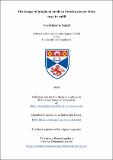The image of utopia in modern Persian poetry from 1941 to 1988
Abstract
This thesis explores the portrayal of utopia in modern Persian poetry between 1941 and 1988. The study begins by examining classical utopias in the Persian-speaking world and then delves into the transformations of utopias during the early modern period in Iran. It further investigates the influence of four significant events: the Anglo-Soviet invasion of Iran in 1941 during World War II, the August 1953 coup, the 1979 revolution, and the eight-year Iran-Iraq war (1980-1988) on the representation of utopia in modern Persian poetry. Four prominent modern Persian poets are analysed in this study: Mehdi Akhāvan-sāles, Simin Behbahāni, Ahmad Shamlou, and Fereydun Moshiri. The first three poets pioneered new styles in Modern Persian poetry, while the last one is among the most-read poets of Iran.
The analysis reveals that the first three events had a profound impact on the literary nature of utopia and the conveyed themes. The political liberation that followed the occupation of Iran led to the prevalence of utopias with socialist themes in the poetry of these poets. However, with the 1953 coup and the ensuing atmosphere of despair and turmoil engulfing society, the poems shifted towards dystopian themes. Within this context, two approaches to dystopia emerged. Firstly, society was depicted as an unchangeable dystopia, reflecting the concept of the demise of utopia. Subsequently, a concept known as ‘loveable dystopia’ took shape, as the poets utilized the sense of spatial belonging to portray the dialectical tension between the dystopian environment and their emotional attachment to it.
As social activities intensified and the 1979 revolution approached, hopes for constructing a utopia were rekindled in the poets’ compositions. However, this hope fades away quickly. Despite expectations, the eight-year Iran-Iraq war did not have a significant influence on the utopian literature of this period. In their final utopian works, Shamlou and Akhavān-sāles go back to the portrayal of a dystopia from which there is no escape, while Behbahāni and Moshiri embraced a more optimistic stance. They presented their last utopian visions with hopes for their realization of a utopia in an unknown future.
Type
Thesis, PhD Doctor of Philosophy
Rights
Creative Commons Attribution-NonCommercial-ShareAlike 4.0 International
http://creativecommons.org/licenses/by-nc-sa/4.0/
Collections
Except where otherwise noted within the work, this item's licence for re-use is described as Creative Commons Attribution-NonCommercial-ShareAlike 4.0 International
Items in the St Andrews Research Repository are protected by copyright, with all rights reserved, unless otherwise indicated.
Related items
Showing items related by title, author, creator and subject.
-
Timescapes of independence : temporality, utopia and living the future in Scotland
Manley, Gabriela (University of St Andrews, 2022-06-13) - ThesisBased on fifteen months of ethnographic fieldwork amongst Edinburgh Scottish National Party (SNP) activists, this thesis argues that the future forms a key element of political life and plays a greater role than the past ... -
Dystopia and the divided kingdom : twenty-first century British dystopian fiction and the politics of dissensus
Welstead, Adam (University of St Andrews, 2019-06-25) - ThesisThis doctoral thesis examines the ways in which contemporary writers have adopted the critical dystopian mode in order to radically deconstruct the socio-political conditions that preclude equality, inclusion and collective ... -
Utopia in the age of Realism : Theodor Fontane's Quitt
White, Michael James (2018-01-30) - Journal articleThe principal argument of this essay is that Theodor Fontane’s Quitt (1890) can be read as a critical engagement with utopianism. Quitt has previously been analysed as a utopian novel in a narrow sense, specifically because ...


